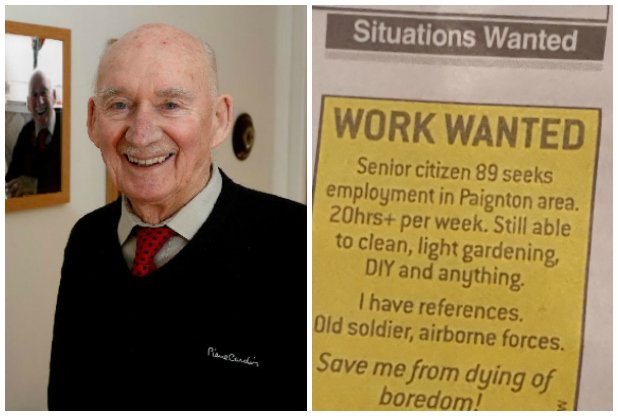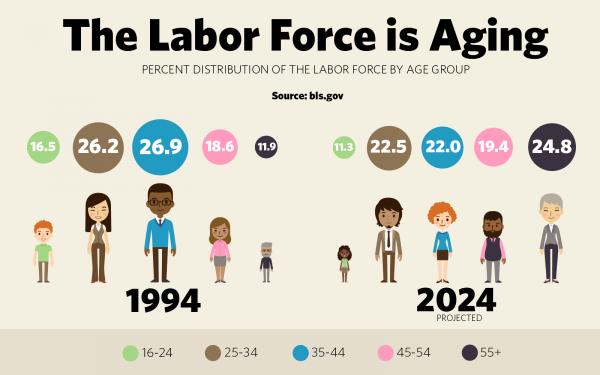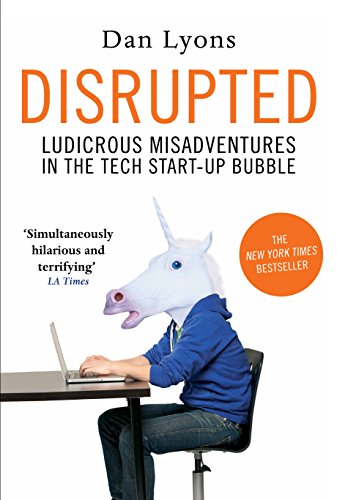Happy Monday!
It’s not an oxymoron. When you enjoy your work and the people you work with / for, Mondays can be happy.
Which rather neatly ties to the theme of this week’s Monday mature marketing round-up. Our top links this week all touch on how work can help us enjoy active, independent lives as we age.
MOST SHARED: There’s no age-based ‘shelf life’ on senior’s ability to live independently
Carol Bradley Bursack has a website dedicated to caregiving, and she answers caregiving related questions in a column for North Dakota’s Inforum.
Just before Thanksgiving, Bursack answered a question from an adult child who was receiving pressure to move his very independent 73-year-old father out of his own house, to begin to take over managing his father’s life.
Bursack’s response? Politely point out that “aging itself doesn’t automatically make people unable to live independently.”
Noting that the father was part of a senior volunteer program, Bursack wrote:
“Millions of older people are a vital part of their communities. No one can wave a magic wand and overcome the attitude in our society that paints seniors as most likely muddled and unable to contribute to society. However, one person at a time, we can call attention to those seniors — and there are many — who remain gainfully employed, who are entrepreneurs, who give their time and energy to help others, or who simply lead satisfying lives that contribute toward our overall economy.”
At a senior living conference this year, several speakers addressed the idea of doing WITH seniors not FOR or TO them, of perpetuating a sense of purpose. Work — whether volunteering or paid — is one way of continuing to express and enjoy a sense of purpose.
Read Bursack’s column: http://bit.ly/2h6bI9e
MOST CLICKED: 89-Year-Old UK Veteran Seeks Work To Stop Him From “Dying of Boredom”
Across the pond and a few years down the road, another older adult helps us see how vocational wellness is an important dimension as we age.
Devon resident Joe Bartley retired at age 83 (6 years ago) and discovered that being unemployed wasn’t for him. Why?
All that free time in retirement has meant more time to feel lonely and bored.
So he took out an advertisement that reads:
Work wanted. Senior citizen 89 seeks employment in Paignton area. 20hrs+ per week. Still able to clean, light gardening, DIY and anything. I have references. Old soldier, airborne forces. Save me from dying of boredom!

Not only would Mr. Bartley gain a great deal from employment, society would as well. He’d be more independent financially: “I wanted at least 20 hours and then I can cover the rent. I get housing support, which is great, but I want to be my own man and pay my own way,” said Bartley.
Read more about Mr. Bartley: http://on.mash.to/2gY4DbZ
UPDATE 12/5/16: Mr. Bartley started a new job today at the Cantina Bar & Kitchen in Paignton, with a BBC camera crew in attendance and rounds of applause from restaurant patrons. http://on.mash.to/2hbYwjj
When Mr. Bartley returns to work, he’ll exemplify a trend found in the United Kingdom and the United States — an aging workforce.
The US Department of Labor recently shared statistics in a post that was the second most read link of ours last week.
“By 2024, nearly 1 in 4 people in the labor force are projected to be age 55 or over.
This is a big change from 1994, when people ages 55 and older represented only 11.9 percent of the labor force – a share smaller than those held by other age groups: 16-24, 25-34, 35-44 and 45-54. But by 2024, their projected share will be the largest among these age groups …
Research shows many older people are remaining in the labor force longer than those from previous generations. According to one study, about 60 percent of older workers with a “career job” retire and move to a “bridge job”; that is, a short-term and/or part-time position. Another study found that about half of retirees followed nontraditional paths of retirement in that they did not exit the labor force permanently.”
Here’s a cute Department of Labor infographic representing the shift expected as Baby Boomers remain in the workforce as they age:

The Department of Labor notes four reasons why Boomers and Silent Generation folks (like Mr. Bartley) aren’t taking the traditional route, vocationally speaking: to keep their company-sponsored health coverage, the dramatic decrease in company-sponsored retirement plans, the increase in the Social Security retirement age and … (here’s where we get back to today’s theme)
the wish to remain active and healthy throughout a longer life.
Working is an important element in the formula for remaining active and healthy.
Get more aging-workforce insights from the US Department of Labor: http://bit.ly/2ha2fln
Also of Note: Age-discrimination within Silicon Valley’s top tech companies
Be my own man; live independently; pay my own way; stay active and healthy. These are timeless, ageless desires.
And yet …
USA Today reports that in the last four years, 90-plus complaints and lawsuits have been filed against tech companies in California alone.
“The rash of actions, and an increase in age-related lawsuits against tech companies, isn’t surprising to those in Silicon Valley. Legal experts and employees say a confluence of factors have deepened the problem: an aging workforce of people who want to, and have to, work longer; a spike in mergers and restructurings that have led companies to shed tens of thousands of workers; and evolving skill sets that have marginalized some workers and put a premium on others.”
 (Disrupted, a much-publicized book by Dan Lyons, chronicles one man’s experiences with marginalization and ageism in tech.)
(Disrupted, a much-publicized book by Dan Lyons, chronicles one man’s experiences with marginalization and ageism in tech.)
Read about the rise in ageism lawsuits specific to tech: http://usat.ly/2gTYey5
As Jon Swartz wrote in USA Today, “The spate of suits are a reminder that Silicon Valley’s tendency to celebrate youth and newness can also veer into charges of discrimination based on age.”
Excuse me while I step onto my soapbox, but I see this as a call to action for those of us who market products and services to older adults.
What can YOU do this week to point out, politely, that there is no age-based shelf life to independence? To respect youth and newness but celebrate age and experience wherever possible? For 55+ housing and senior living readers, what are your organizations doing to support and promote vocational wellness?
Please share your thoughts using the comments section, below. Happy Monday!


